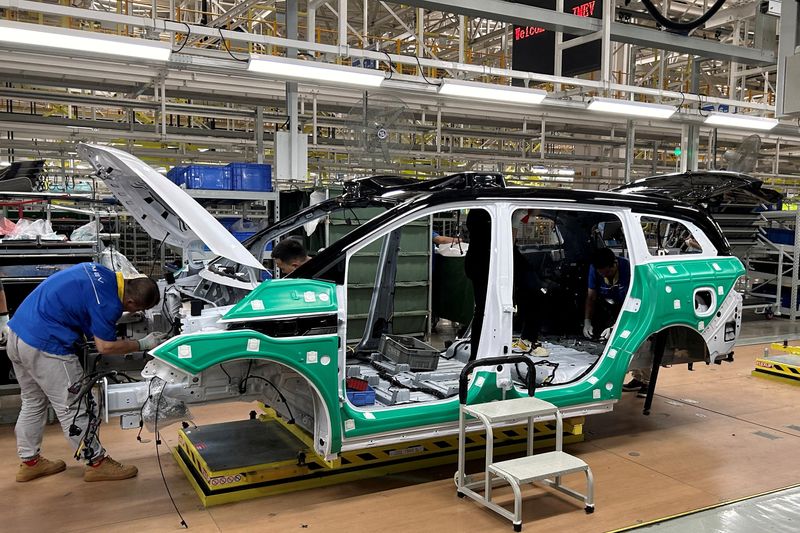BEIJING (Reuters) – China’s factory activity grew in December but at a slower-than-expected pace, as overall sales were dampened by falling export orders amid concerns over the trade outlook, a private-sector survey showed on Thursday.
The data echoed an official survey on Tuesday showing manufacturing activity expanded modestly, reinforcing calls for more stimulus to spur growth this year as Donald Trump will soon take office and likely intensify U.S.-China trade tensions.
The Caixin/S&P Global manufacturing PMI nudged down to 50.5 in December from 51.5 the previous month, undershooting analysts’ forecasts in a Reuters poll of 51.7.
The rate of output expansion eased to a three-month low as growth in new orders slowed.
New export orders, in particular, returned to contractionary terrain, marking the fourth month of decline in the past five months. Subdued external economic conditions and threats of new U.S. tariffs pose major risks for the world’s top exporter of goods.
While some Chinese exporters and their U.S. buyers may have ramped up shipments recently in expectation of the Trump tariffs, a report published by China Beige Book suggested that the last-minute push may be waning.
“The pulling forward of trade before anticipated 2025 tariffs has ended. The only rescue in on-year terms is if Trump’s China tariff talk is hot air,” China Beige Book said.
Since Beijing unveiled a series of policy support measures late last year, some sectors have seen economic activity stabilise. Markets are monitoring Beijing’s next policy steps, as policymakers make reviving domestic demand a priority.
Chinese manufacturers maintained an optimistic view about output in 2025 though the degree of optimism eased to the lowest since September. Their concerns about the outlook for growth and trade, especially amid U.S. tariff threats, challenged hopes for new product- and policy-driven sales growth this year.
Growth in the stocks of purchases eased and post-production inventory accumulated in December.
Staffing levels declined for a fourth successive month, but the rate of job shedding was softer than November.
Average selling prices declined for the first time since September, in contrast to another increase in input prices.
Respondents said that they had absorbed cost increases and further lowered selling prices to support sales. Export charges also declined.

“The external environment is expected to be more complex this year, requiring early policy preparation and instant response,” said Wang Zhe, economist at Caixin Insight Group, calling for official efforts to increase household income and improve people’s livelihoods.
Policymakers have vowed to raise pensions and expand a consumer goods trade-in scheme in 2025, adding they will work to increase household incomes and “vigorously boost consumption”.
#Growth #Chinas #factory #activity #slows #Caixin #PMI #shows #Reuters